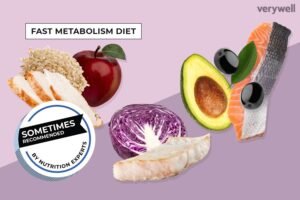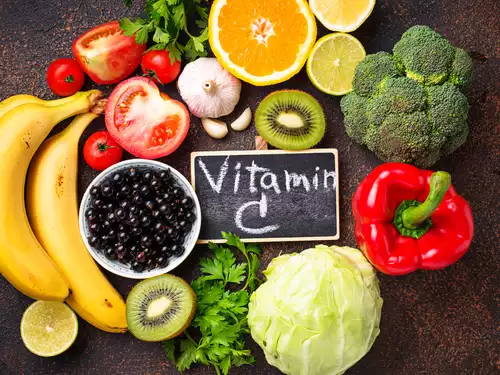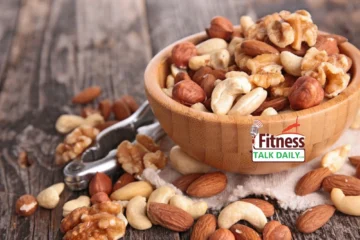Increasing your metabolism naturally is essential for effective weight loss and healthy living in general. Vitamins and minerals like Vitamin B complex, Vitamin D, iron, magnesium, and calcium are all very important for optimal metabolic functioning.
These nutrients aid in transforming that food into energy, optimizing blood sugars, boosting fat burning capability, and supporting overall health and well-being. By introducing foods that are rich in these nutrients – like leafy greens, salmon, nuts, and dairy – into your diet, you can accelerate your ability to burn calories more efficiently, support permanent weight loss. Fuel your body with these essential nutrients today for a better metabolism and a better you!
A healthy metabolism is important to obtain and maintain weight loss. Vitamins and minerals are essential nutrients that contribute to overall health and health and metabolism. If you are looking for natural ways to boost your metabolism and assist in weight loss, introducing the right nutrients is a great place to start.
In this article, we will look at the top five vitamins and minerals with clinical support for helpful metabolism and ongoing weight maintenance. Let’s get started!
What Is Metabolism, and Why Does It Matter?
Metabolism refers to the chemical processes in your body that break down your foods into energy. A faster metabolism means your body burns calories more effectively, which helps to lose, or maintain your weight. Some of the vitamins and minerals you consume serve as catalysts for reactions that metabolize food, ultimately ensuring that the body functions optimally.
Here are 5 nutrients you need for a metabolic push. Metabolism is the biological process in which your body changes the foods and drinks you consume into energy. The term encompasses all of the chemical reactions that occur in your body to maintain you alive, from breathing to cell repair, to blood pumping.
Metabolism ensures that your body has the energy it needs, when resting and/or active, to operate properly. It is also critical to understand metabolism because it affects how your body uses energy, and the health of your life. Let us delve extensively into it, its components, types, and importance.
How Metabolism Works
Metabolism fundamentally comprises two processes:
Catabolism (Breaking Down)
Catabolism is breaking down molecules from the food you eat into smaller components such as glucose, amino acids, and fatty acids. The smaller components are used to release energy that fuels your body.
For instance, carbohydrates are broken down into glucose to be utilized for energy in the cells.
Anabolism (Building Up)
Anabolism is the use of energy to build and repair tissues, store nutrients, and make everything from hormones to enzymes that your body needs.
An example is protein, which is used to repair muscle tissues while fats are a long-term source of energy to be stored.
Types of Metabolism
Metabolism can be divided into three primary categories based on how your body uses that energy:
Basal Metabolic Rate (BMR)
This is the energy your body uses at rest to perform the basic functions of breathing, pumping blood, and maintaining body temperature. BMR accounts for approximately 60 to 70 percent of the energy you expend each day.
Thermic Effect of Food (TEF)
This is the energy your body uses to digest, absorb and process food. Proteins are the most energy-intensive to process, followed by carbohydrates, and lastly fats. TEF accounts for about 10 percent of the calories you burn in a day.
Physical Activity
This is the energy spent during any movement including exercise or just moving around for activities of daily living such as walking or cleaning. Physical activity is the most variable component in your total metabolism.
Elements Influencing Your Metabolism: –
Your metabolic rate—the rate at which you burn
calories—may change on account of numerous influences:
Age: Your metabolism generally declines as you age due to loss of muscle mass as well as overall hormonal changes.
Muscle Mass: The more muscle mass you have, the more calories your body burns—when active or inactive.
Gender: Men, on average, have a higher metabolic rate than women due to more muscle mass and less body fat.
Genetics: Some fundamentally genetically based individuals are just prone to have a slower/faster metabolism.
Levels of Activity: The more you exercise and are active, the more the metabolism rises.
Diet. Eating nutrient-dense foods may assist your metabolism; while skipping meals or eating fast or processed foods may hinder it.
1. Vitamin B Complex: The Metabolic Powerhouse
Vitamin B complex refers to eight important vitamins, which include vitamins B1 (thiamine), B2 (riboflavin), B3 (niacin), B5 (pantothenic acid), B6, B7 (biotin), B9 (folate), and B12. These vitamins are important in the conversion of carbohydrates, proteins, and fats into energy.
Benefits:
- Enhances energy production.
- Supports healthy digestion.
- Reduces fatigue, keeping you active and burning calories.
Food Sources:
- Whole grains, eggs, dairy products, leafy greens, and lean meats.
| Vitamin B Type | Primary Food Sources | Metabolic Benefit |
|---|---|---|
| B12 | Eggs, fish, dairy | Boosts energy and red blood cells |
| B6 | Bananas, potatoes, poultry | Regulates protein metabolism |

2. Vitamin D: The Sunshine Nutrient
Vitamin D is important for calcium absorption, whereas it may also be a key factor in your metabolic health. Studies have shown that vitamin D deficiency is associated with a slower metabolism and weight gain.
Benefits: Helps to control blood sugar levels. Helps improve muscle function which may help to burn more calories.
Food Sources: Salmon, fortified milk and egg yolks, as well as sunlight exposure.
Pro Tip: Spending 10-15 minutes of sunshine each day will significantly increase your Vitamin D levels.
3. Iron: Oxygen Transporter for Fat Burning
- Iron is essential for transporting oxygen to your muscles and tissues, which helps them utilize fat more effectively. If you have low iron levels, your metabolism will slow down, and you may feel fatigued.
- Benefits: Helps to support your energy production during metabolism. Helps to improve your endurance in your workouts to also support weight loss.Food Sources: Red meat, spinach, lentils and tofu.
4. Magnesium: The Metabolism Stabilizer
Magnesium plays a role in over 300 biochemical reactions in the body, such as energy production and muscle function.
Vitality: Support healthy muscle contractions. Improves insulin sensitivity, leading to less fat storage.
Food sources include Nuts, seeds, dark chocolate, leafy green vegetables.
5. Calcium: The Fat-Burning Mineral
Calcium is often recognized for its role in bone health, but it is also involved in leptin regulation of fat storage and fat burning. Emerging research indicates that calcium may also have an influence on fat cell breakdown that is naturally occurring in the body.
Benefits: Increased fat breakdown. Decreased fat absorption within the digestive system.
Food Sources: Low fat dairy products, almonds, broccoli, fortified plant-based milk.

How to Incorporate These Nutrients into Your Diet: –
To maximize the benefits of these vitamins and minerals, include a variety of nutrient-dense foods in your daily meals. Here’s a sample meal plan:
| Meal | Suggested Foods |
|---|---|
| Breakfast | Scrambled eggs with spinach and whole-grain toast |
| Snack | Greek yogurt with a handful of almonds |
| Lunch | Grilled salmon with quinoa and steamed broccoli |
| Snack | A banana with a spoonful of peanut butter |
| Dinner | Roast chicken with sweet potatoes and kale |
Benefits of Boosting Your Metabolism Naturally: –
You will not only improve your metabolism by guaranteeing adequate vitamin and mineral intake, but you will also obtain the bonus of:
Increased Energy: You will feel energized all day long.
Weight Management: Extensive burning of calories, and maintenance of weight.
Proper Digestion: Adequate nutrient intake allows for the body to function properly in the gut.
Recovery from Fatigue: Vitamins such as B12 and iron will help fight off ill–fated feelings of tiredness.
Take Charge of Your Metabolism-
A great way to help with weight loss and improve your overall health is to add metabolism-accelerating vitamins and minerals to your diet. Try to eat foods that contain high quantities of nutrients, such as green leafy vegetables, lean meats and proteins, nuts, fortified items, etc.
Start by adding one or two of the vitamins or minerals in your daily diet and fortify your meals as you become more balanced and comfortable. Be sure to continue exercising daily and drinking enough water to support your goals.
Your metabolism is the basis of for how you live—from breathing to exercising, your metabolism is what provides you with energy. By getting to know your metabolism and making changes in habits that affect metabolism, you can increase your body’s metabolic rate and overall health.
Whether your goals are weight management, increased energy, or long-term health, supporting your metabolism is smart and effective.
Start taking responsibility for your health today: eat foods that are full of nutrients, keep your body moving, and adopt healthy habits to encourage an efficient and active metabolism!




